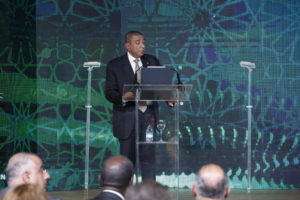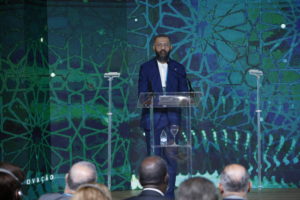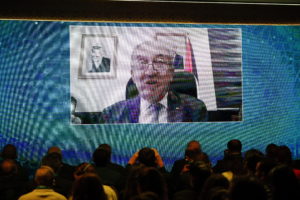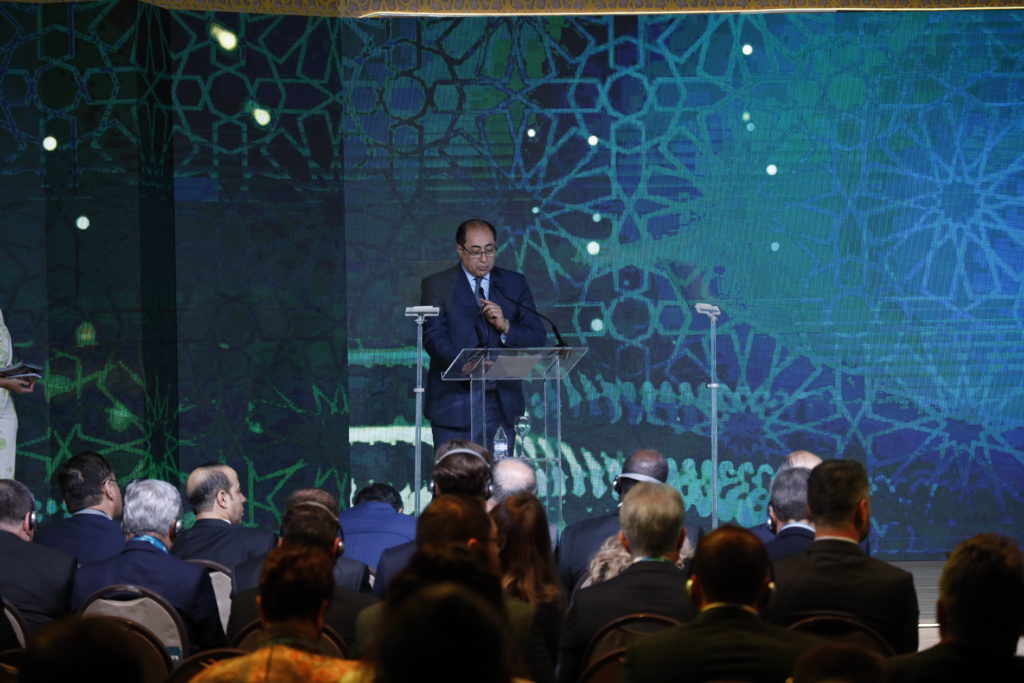São Paulo – The League of Arab States plan on launching a new agreement between Arab countries to improve the investment climate, facilitate capital and businesspeople movements across the region, create more job opportunities, and decrease unemployment rates.
Arab League assistant secretary-general Hossam Zaki (pictured above) urged Brazil to look at the investment opportunities available in the Arab countries in order to benefit from the incentives offered to foreigners, shift from a simple trade to actual investments, and strengthen ties between the countries.
Zaki spoke at the opening of the Economic Forum Brazil & Arab Countries and praised the role played by the Arab Brazilian Chamber of Commerce (ABCC) in bringing the Arab countries and Brazil closer together, and conveyed the congratulations of Arab League secretary-general Ahmed Aboul Gheit to the institution for its 70th anniversary.
Zaki underscored that the crisis that the global economy is going through calls for different ways to deal with the situation, as unemployment, inflation, and public debt have reached unprecedent levels, not to mention the climate change. He said that all these crises demand dialogue, efforts, alliances and cooperation between countries.
The assistant secretary-general highlighted that the Arab countries have taken several steps to encourage investments and attract foreign investors and called for the Brazilian companies and government to study these markets and their opportunities in order to achieve economic integration.
Zaki stressed that the politics and economics are two sides of a coin, and that the volume of trade between Brazil and the Arab countries, which reached USD 24.3 billion last year, indicates the proximity between both sides, especially since these numbers have achieved good rates of growth year after year.
For a direct shipping lane
In his participation in the opening of the Economic Forum Brazil & Arab Countries, Union of Arab Chambers vice president and Bahrain Chamber chairman Sameer Nass called for streamlining the establishment of a direct shipping lane between the Arab countries and Brazil in order to facilitate the circulation of trade and investments between both sides.

According to him a direct shipping lane would play a key role in overcoming the obstacles to the development of economic relations, especially in the face of significant freight cost increases and their impact on final product prices. The lane would be important, he said, to develop trade ties not only with Brazil but also Latin America as a whole.
Nass said that it was a great honor for him to participate in the event celebrating the 70th anniversary of the ABCC and stressed the role that the institution has played in recent years to further economic and trade relations between the Arab countries and Brazil, besides bringing closer together the investment opportunities between both regions.
As the chairman of the Bahrain Chamber, Nass said that the economic relations between his country and Brazil have significantly evolved in recent years and that Brazil became Bahrain’s leading supplier last year, overtaking China.
Supporting the rapprochement

Islamic Chamber of Commerce, Industry and Agriculture secretary-general Youssef Hassan Khalawi announced his institution’s commitment to support the ABCC’s efforts to bring the Arab and Brazilian peoples closer together. He praised the choice of the theme of the forum, Legacy and Innovation, as it illustrates the depth and progress of Brazil-Arab relations from the beginning.
The Islamic Chamber’s secretary-general stressed the need for building on Brazil’s unique experience in investing in natural resources, which made it a true model of innovation, pointing out opportunities available for building bridges of innovation between Brazil and the Arab world to achieve a constructive communication between both parties.
Palestine’s economy

Palestine’s National Economy minister Khalid Al-Esseily participated online in the opening of the forum and said that many steps have been taken by his country to improve the business environment, as well as providing incentives to attract foreign investments and encourage e-commerce.
He talked about the efforts for a free trade agreement with Mercosur and said Palestine has many products to offer like plastics, clothing and textile, as well as cultural heritage crafts that make reference to the Palestinian history and struggle
Esseily said that Palestine has recently passed a law that encourages foreign investment and that a legislation is being drafted to regulate e-commerce, as well as expanding rules governing investment in energy and digital transformation and establishing storehouses to ensure food security and food requirements in the country.
The Economic Forum Brazil & Arab Countries is held by the ABCC in partnership with the Union of Arab Chambers, supported by the League of Arab States and sponsored by Travel Plus, Brazil Trade and Investment Promotion Agency (ApexBrasil), Fambras Halal, Embraer, Itaipu Technology Park, Pantanal Trading, Embratur, Khalifa Industrial Zone Abu Dhabi (KIZAD), Cdial Halal, Modern Living, BRF, Egyzone/Am Development, Antika/Openet BV, First Abu Dhabi Bank, Egyptian Financial & Industrial Co. (EFIC), Suez Company for Fertilizers Production (SCFP), Boa Esperança Agriculture Cooperative (CAPEBE), Prima Foods, and Afrinvest.
Here’s more on the Economic Forum Brazil & Arab Countries.
Translated by Ahmed El Nagari and Guilherme Miranda




